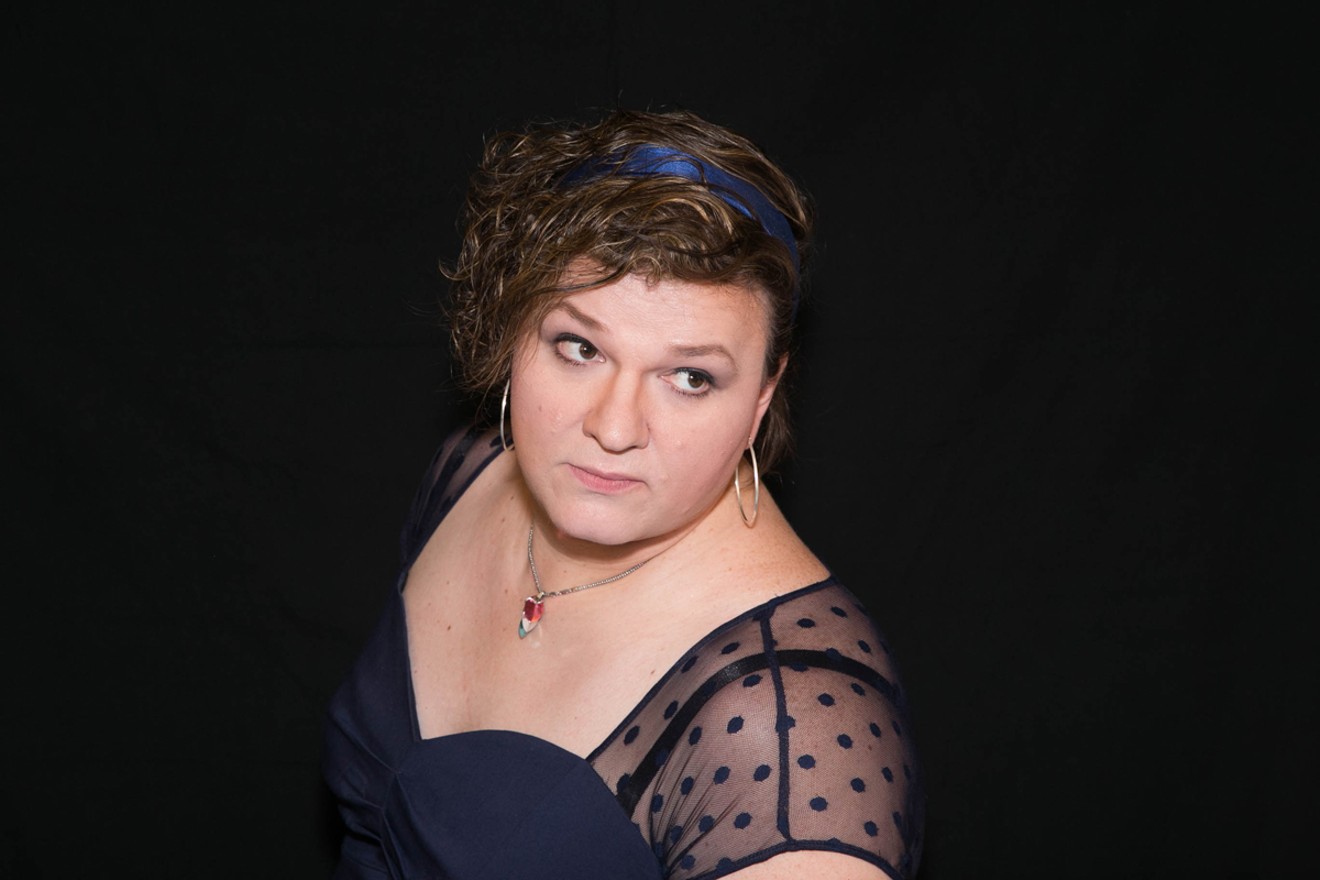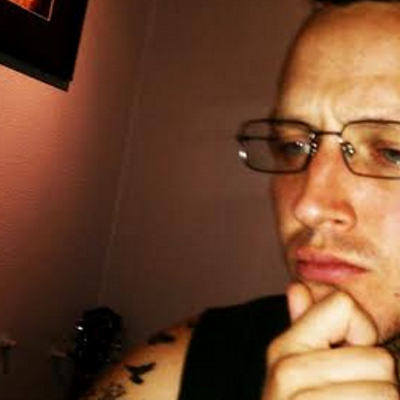Josselyn Cool warns that she will be in full “boy mode” when she arrives for an interview, and therefore in a bad mood.
“I have to grow out facial hair [for electrolysis],” she says. “I don’t like having a beard and wearing a dress at the same time.”
When Cool shows up, wearing a salmon-colored tunic and jeans, she is far from bearded; a few stray blond hairs show on her otherwise smooth face.
“I know they’re not that noticeable,” she says, “but they’re all I can see. Right now I fucking hate my body, because I’m not there yet. I’m only six months in.”
For the first 34 years of her life, Josie Cool was known as Joshua. Last year, she came out as a transgender woman and legally changed her name to Josselyn.
“I remember being eight or nine and lying in bed, wishing I woke up in the morning as a girl,” she says. “I wanted to wake up in the morning and have everyone know I was a girl the whole time. I’d make that wish before blowing out birthday candles.”
Cool was born and raised in North Platte, Nebraska, by parents she describes as “peaceful hippies.”
“My dad would tell me stories about acid flashbacks, and about smoking peyote with Native Americans,” Cool says. “My way of rebelling was wanting to go to college, getting a job and becoming a professional.”
Despite aspiring to be “as straight and narrow as possible,” Cool, from her earliest memories, cross-dressed in secret.
“I assumed my parents knew something,” she says, “My mom’s clothes were always stretched out. I couldn’t fit into them, but I still wore them.”
But when she was twelve, she and her dad were watching an episode of ER with a transgender character.
“My dad looked over at me and said, ‘Josh, the one thing I want out of you in life is to never tell me you want to be a woman.’ I had worn a dress the night before. I just looked at him and said, ‘Yeah, I’m not gonna be a freak like that.’”
For her sophomore year of high school, Cool’s family moved to Casper, Wyoming, where she immersed herself in the town’s surprisingly strong punk scene.
“Mustard Plug came through town once, and the whole cheerleading squad and football team came,” she recalls. “There were three ska bands and a dozen punk bands in a town of 80,000 people.”
Cool bonded with musicians in the Nut Sockets and One Good Eye, eventually starting her own band with friends called Overview.
“When I was younger, the dysphoria always happened when I was bored,” she says. “Since I was busy and focusing on music, I never had time for it.”
After high school, she moved to Denver to attend the Art Institute of Colorado. She landed in a $350-a-month Capitol Hill apartment and fell into the music scene.
“I was a total punk, but considered myself an ‘art punk,”’ she says. “I loved loud bashing of cymbals, but there’s something to be said about dynamics. I wanted to start an alt-country band, because I was listening to Dire Straits and didn’t want to listen to Waylon Jennings.”
To that end, Cool and some friends started Out on Bail. The group carved out a niche in Denver, sharing bills with other roots bands like Ghost Buffalo and Red Cloud West while still being loud and raucous enough to play alongside heavier acts like Pariah Caste, To Be Eaten and the Facet.
Cool was still closeted, but the lyrics she wrote for Out on Bail were revealing. In the song “Coke to Make Whiskey,” for instance, she wrote: “Living two lives that don’t quite fit/I built them both up with grease and spit/To choose one is to kill the other/But it’s breaking my heart to keep them together.”
Her liberal music community still didn’t know she was a woman, though, so she started dropping hints. One Halloween, she wore a Gypsy Rose costume to a party.
“I spent an hour and half on makeup, and I made myself as perfect as I could. I showed up to the party wearing three-inch heels that I could maneuver in fine since I had been wearing them for so long.”
Some of Cool’s friends didn’t recognize her. “I had passed for a real woman, and it was a huge deal for me,” she recalls.
But playing music, working full-time as a graphic designer/press operator and being in a serious romantic relationship with her partner, Jenn Louise, didn’t leave much time to mull over her situation.
After a disastrous Out on Bail tour through the Midwest that was marred by financial mishaps and canceled shows, her anguish over her identity exploded in Minneapolis.
She remembers screaming at bassist Mike Taylor. “We were sitting in the front seat of the van, and I was just shouting obscenities at him. That was when everything changed for me.”
She blames her explosion on the dysphoria and says it was partly what led to the group’s breakup.
After Out on Bail imploded, Cool set out to start more ambitious musical projects, including short-lived bands the Uncertain Sea and Spokeshaver.
“I got in a bad spot and started thinking that I was better than everyone I was playing with,” she says. “I realize now that a lot of that was false bravado and trying to boost myself up because I was depressed...and dealing with a lot of dysphoria and gender-identity issues.”
During that time, Cool grew close with vocalist Kristin Garramone, her collaborator in Spokeshaver. The two also helped start the band Great American House Fire. In Garramone, Cool found both a talented vocalist and a true confidante.
“In my head, I always thought I should tell Kristin,” she says. “I just knew she’d be an open and accommodating person, and I knew she would accept it.”
She was close to confiding in Garramone in 2015 when a series of tragedies altered her plans. Her grandmother, with whom she was close, died in May.
“She was really important to me and did everything she could to make sure me and my family were all as happy as possible,” Cool remembers.
Sorting out her grandmother’s estate proved to be physically and emotionally taxing for Cool and her family, particularly her father, who was already in poor health. A month later, he fell asleep while driving in Wyoming, rolled his car and died.
The combined tragedies devastated Cool’s family, but instead of crying, she kept it together and dealt with her grandmother’s and father’s estates.
“I was the ‘man’ of the family,” she says. “I bucked up and took care of it. Any sort of gender stuff I had going on, I just bottled, the same way I had been doing for years. I bottled everything.”
But the trauma left her depressed and more prone to lash out.
“I couldn’t tell if it was anger or dysphoria, but it all came out the same way,” she says. “While I was dealing with this, my band was losing members every six months, and I just kept getting angrier and angrier.”
She knew something had to change. After practice one night, she and Garramone sat down for a long talk. As Cool angled toward the subject of being transgender, Garramone dropped a bomb.
“She told me that [bandmate] Mikaela [formerly Mike Berkesch] had come out to her as transgender,” she says. “Kristin assumed that I knew about Mika, but I didn’t. Mika had apparently been on hormones for four years but wasn’t out to anyone publicly.”
Bolstered by the news, she responded, “That’s amazing — so am I.”
Garramone’s response was as welcoming as Cool had hoped, and she knew she could tell other people.
One night, she came out to Louise during a fight. “I told her I was gender-dysmorphic and body-dysmorphic and that I hated myself,” she says. “She went to bed and laid down without saying much. I then realized that if I didn’t transition, she might leave me anyway because I am so unhappy, so I might as well give it a shot.”
Cool began seeing a therapist. “I hoped she would tell me I wasn’t actually trans,” she says, “but I told her my whole story, and she told me that I was obviously transgender.”
From there, Cool knew that she had to revisit the conversation with Louise, who identifies as heterosexual, and let her know that she would now be dating a woman.
“She didn’t know if she would be attracted to me or if she could live with me, but I told her I needed to do it anyway,” Cool says. “I didn’t want to lose her, but we both knew I had to do it either way. She told me she would never be out of my life and that she would be my best friend no matter what. She ultimately decided that she loved me as a person, no matter the vessel.”
Backed by a supportive partner and bandmates, Cool told more friends, started dressing in a more feminine way and began hormone replacement therapy. A few weeks ago, she legally changed her name from Josh to Josselyn.
Coming out didn’t solve her depression, but it helped. She reached out to other trans musicians in Denver, including comedian and musician Jordan Wieleba. The two talked about forming an all-trans-women band. Sadly, Wieleba passed away unexpectedly in September last year.
“When Jordan passed, I cried for hours, and I hardly knew her,” Cool says. “I wanted to be her friend so bad. I thought we could be such good friends. She was out and a confident teacher for our community.”
After Wieleba’s death, Cool fulfilled their vision, forming an all-trans-women band with Mika Berkesch called ScarTalk.
Cool still performs in Great American House Fire, as does Mikaela, but in ScarTalk, she has a harbor where she doesn’t have to worry about fitting in with her cis-gender peers. She’s found a family, a home.
“ScarTalk is raw and honest musically, with confessional, diary-style lyrics,” Cool says. “We’re all trans women, and we’ve had somewhat similar experiences with gender and hiding it from ourselves and the outside world.”
Cool hopes ScarTalk can “let people know there are other trans punks out there.”
While she still has big questions and challenges to face about transitioning and living as a woman, Cool better understands her past and future.
“I’m the same person I’ve always been. I still play music and work at a print shop. I use different pronouns and am more content. I don’t think of Josh as a different person. People can see I’m the same person I’ve always been.”
[
{
"name": "Air - MediumRectangle - Inline Content - Mobile Display Size",
"component": "12017618",
"insertPoint": "2",
"requiredCountToDisplay": "2"
},{
"name": "Editor Picks",
"component": "17242653",
"insertPoint": "4",
"requiredCountToDisplay": "1"
},{
"name": "Inline Links",
"component": "18838239",
"insertPoint": "8th",
"startingPoint": 8,
"requiredCountToDisplay": "7",
"maxInsertions": 25
},{
"name": "Air - MediumRectangle - Combo - Inline Content",
"component": "17261320",
"insertPoint": "8th",
"startingPoint": 8,
"requiredCountToDisplay": "7",
"maxInsertions": 25
},{
"name": "Inline Links",
"component": "18838239",
"insertPoint": "8th",
"startingPoint": 12,
"requiredCountToDisplay": "11",
"maxInsertions": 25
},{
"name": "Air - Leaderboard Tower - Combo - Inline Content",
"component": "17261321",
"insertPoint": "8th",
"startingPoint": 12,
"requiredCountToDisplay": "11",
"maxInsertions": 25
}
]












